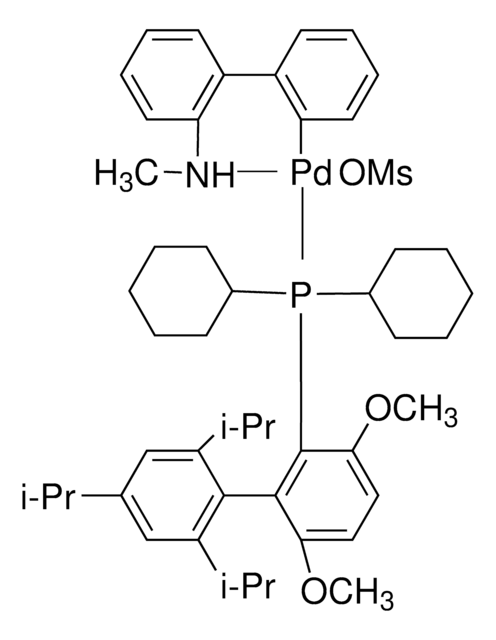708739
tBuXPhos Pd G1
Synonym(s):
t-BuXPhos palladium(II) phenethylamine chloride, tBuXPhos-Pd-G1, Chloro[2-(di-tert-butylphosphino)-2′,4′,6′-triisopropyl-1,1′-biphenyl][2-(2-aminoethyl)phenyl)]palladium(II), [2-(Di-tert-butylphosphino)-2′,4′,6′-triisopropyl-1,1′-biphenyl][2-(2-aminoethyl)phenyl)]palladium(II) chloride, t-BuXPhos Palladacycle, t-BuXPhos precatalyst
About This Item
Recommended Products
form
solid
feature
generation 1
reaction suitability
core: palladium
reaction type: Buchwald-Hartwig Cross Coupling Reaction
reaction type: Heck Reaction
reaction type: Hiyama Coupling
reaction type: Negishi Coupling
reaction type: Sonogashira Coupling
reaction type: Stille Coupling
reaction type: Suzuki-Miyaura Coupling
reagent type: catalyst
reaction type: Cross Couplings
mp
150-159 °C
functional group
phosphine
SMILES string
NCCc1ccccc1[Pd]Cl.CC(C)c2cc(C(C)C)c(c(c2)C(C)C)-c3ccccc3P(C(C)(C)C)C(C)(C)C
InChI
1S/C29H45P.C8H10N.ClH.Pd/c1-19(2)22-17-24(20(3)4)27(25(18-22)21(5)6)23-15-13-14-16-26(23)30(28(7,8)9)29(10,11)12;9-7-6-8-4-2-1-3-5-8;;/h13-21H,1-12H3;1-4H,6-7,9H2;1H;/q;;;+1/p-1
InChI key
LQRWNWRVOIDQOD-UHFFFAOYSA-M
Application
Legal Information
Signal Word
Warning
Hazard Statements
Precautionary Statements
Hazard Classifications
Carc. 2 - Eye Irrit. 2 - Skin Irrit. 2 - STOT SE 3
Target Organs
Respiratory system
Storage Class Code
11 - Combustible Solids
WGK
WGK 3
Flash Point(F)
Not applicable
Flash Point(C)
Not applicable
Personal Protective Equipment
Certificates of Analysis (COA)
Search for Certificates of Analysis (COA) by entering the products Lot/Batch Number. Lot and Batch Numbers can be found on a product’s label following the words ‘Lot’ or ‘Batch’.
Already Own This Product?
Find documentation for the products that you have recently purchased in the Document Library.
Customers Also Viewed
Our team of scientists has experience in all areas of research including Life Science, Material Science, Chemical Synthesis, Chromatography, Analytical and many others.
Contact Technical Service
















